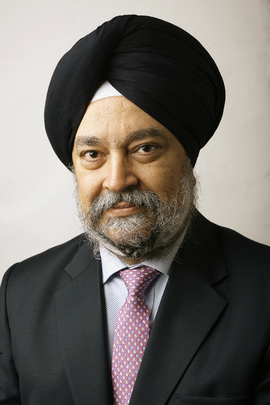The U.N. at 70: A Time for Reflection and Reform
NEW YORK, Jun 05 (IPS) - Seventy years since its inception, the United Nations remains at the core of the multilateral system. The world body, together with the Bretton Woods institutions, was conceived in the mid-1940s by the architects of the postwar order with the central aim of saving succeeding generations from the scourge of war on the one hand, and the need to reconstruct and revive the global economy on the other.
 Ambassador Hardeep S. Puri. UN Photo/Evan Schneider
Ambassador Hardeep S. Puri. UN Photo/Evan Schneider
This was a Westphalian model based on the principle of the sovereign equality of states and a defined concept of inter-state relations. With marginal changes, the system has survived, displaying a remarkable endurance to different geopolitical contexts and crises: from the bipolarity of the Cold War to the decolonisation process.
Despite the resilience shown – and despite its unparalleled convening power – the United Nations continues to face multiple challenges and grapple with the fast-evolving and unprecedented complexity of the current global landscape. In fairness, the speed and nature of change would be hard to handle for any decision-making process.
The fact that the decision making space is occupied both by the Secretary-General and a large bureaucracy and 193 member states does not make it any easier. Very often this creates a sprawling gap between the manifestation of a crisis and the time needed for a response.
Indeed, ever so often global governance structures are perceived to be out of step with emerging needs and the systemic challenges of globalisation. The inter-connectedness of economies and societies means that risks are more contagious and crises reverberate across issues and borders, whether they relate to health, refugees, violence or – more often – all three at the same time.3
This being the case, it stands to reason that responses to crises also have to be global requiring the cooperation, consent and co-ordination of a large number of independent, sovereign member states.
The system itself is not alone at fault. Its central constituents – member states – have rendered the system increasingly contested, unused and thus of limited capacity to deal with the emerging threats to world peace, stability and security.
Such a trend is epitomised by the breakdown of consensus and decision-making at the highest political level: the Security Council, has invited criticism when it authorised the use of force in Libya and when consensus could not be achieved resulting in inaction in Syria, Yemen and Ukraine.
As agents of chaos continue to challenge the forces of order, the international system finds itself at a crossroads that calls for a serious re-evaluation of the bedrock of today's so-called multilateral environment.
How can faith be restored in the value of collective engagement? What innovative policy options can emerge from an increasingly complex and confusing backdrop? Can crisis be the mother of opportunity?
A number of major reviews and intergovernmental discussions are taking place this year on a broad range of topics including peace operations, peacebuilding, the Sustainable Development Goals, financing for development, climate change, humanitarian affairs, the future of the European security architecture, and the implementation of Resolution 1325 on women, peace and security, among others.
As these review processes develop on related but separate tracks, it remains important to reflect upon the connections among them. More importantly, member states will need to step up their effort when it comes to implementing these reforms.
As Secretary General of the Independent Commission on Multilateralism (ICM), an independent audit of the U.N. and wider multilateral system by former and serving statesmen, Ambassadors, and other eminent persons, I see the ICM not only as one part of this continuing process of reform but also a key vehicle to consider how said reform initiatives can be best implemented.
This is not designed to produce a 21st century utopia. It is a more practical exercise than that. The ICM seeks to provide the international community with a range of options on how the U.N. best remains "fit for purpose" against the new challenges confronting the system.
It is clear that only incremental approaches to reform will work. Those couched in humility and with a clear purpose and acceptability are more likely to succeed. The suggestion that all is well with the system and that there is no need in fact to fix it has very few takers.
In other words, where and to what extent does the system need to be tweaked to make it genuinely ‘fit for purpose'? A system that has evolved over seven decades must have many qualities. The cliché that if you did not have the U.N., you would need to invent one is equally true.
Looking back 70 years, more specifically, the closing session of the United Nations Conference in San Francisco on June 26, 1945, we should keep President Truman's words close to us when he asserted that "the Charter….will be expanded and improved as time goes on…changing world conditions will require readjustments". In other words, the mandate for reform lies in the act of creation itself.
Edited by Kitty Stapp
© Inter Press Service (2015) — All Rights ReservedOriginal source: Inter Press Service
 Global Issues
Global Issues